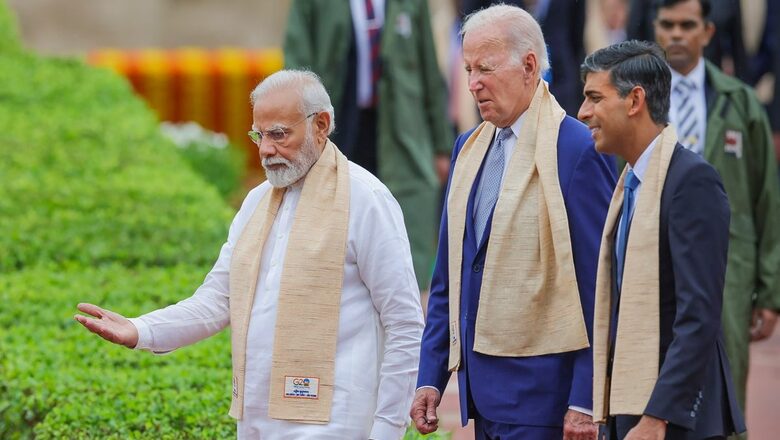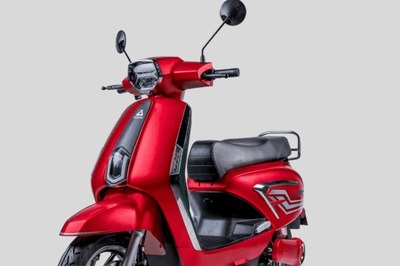
views
Taiwan goes to the polls in January 2024. Anti-China President Tsai Ing-wen has already served two four-year terms. Now, she is ineligible to contest. Unlike the autocratic Chinese President Xi Jinping who declared himself president for life by amending the Chinese Communist Party’s Constitution, Tsai will step aside in democratic Taiwan this January.
Months later, in April 2024, India will hold a decisive Lok Sabha election with Prime Minister Narendra Modi aiming for a historic third consecutive five-year term.
On 5 November 2024, deeply polarised Americans will choose between incumbent US President Joe Biden and former US President Donald Trump.
Weeks later, Rishi Sunak’s Conservative Party will face a British electorate weary of declining living standards, high energy costs and buyer’s remorse over Brexit that has crippled essential services. The Labour Party, led by Keir Starmer is far ahead of the Tories in opinion polls.
These four elections will set the course for global politics in 2024 and beyond. In Taiwan, if the Opposition pro-China Kuomintang party (KMT) wins, peaceful reunification of Taiwan with China will be back on the table. But Tsai’s Democratic Progressive Party (DPP) is well ahead in opinion polls. DPP’s presidential candidate Lai Ching-te is likely to follow Tsai’s pro-independence policy, angering China which has vowed to reunify Taiwan by military force if necessary.
The rise of former Taipei mayor Ko Wen-je has raised the possibility of a third force in Taiwan’s politics – Ko’s newly formed Taiwan People’s Party (TPP) – splitting the vote.
Beijing is watching the Taiwan election campaign closely. So is Washington. With polls scheduled for 13 January 2024, the result could have a major bearing on the China-United States relationship.
The Israel-Hamas and Russia-Ukraine wars have complicated Beijing’s Taiwan strategy as well as its relations with the West. An amphibious invasion of Taiwan which lies 100 miles from the Chinese mainland carries risks. Recent US-Japanese-Korean trilateral military exercises in the South Pacific Sea have telegraphed the message to Beijing that the US and its allies will defend Taiwan if China attacks the island.
Two-war world
With two wars raging in Europe and the Middle East, neither the US nor China wants to open a new front in the Pacific. That could bolster the electoral prospects of the anti-China DPP led now by Lai Ching-te.
Chinese President Xi Jinping is also waiting for the US presidential election in November 2024 before deciding Beijing’s strategy on Taiwan. If former US President Donald Trump returns to power against the odds and despite the criminal cases against him, Xi will seek a transactional modus vivendi with him. Taiwan could emerge as a bargaining chip.
At a town hall in Iowa in July 2023, Trump had called Xi “an exceptionally brilliant individual who governs 1.4 billion people with an iron fist”. But Xi also knows that it was Trump as president who began a damaging trade war with China that US President Joe Biden has broadened with a ban on high-tech exports to Beijing. For Xi, both Trump and Biden are cut from broadly the same anti-China cloth.
The other key general election in 2024 with broad geopolitical implications is in India. Prime Minister Narendra Modi has proved a thorn in China’s side. With the military standoff at the Line of Actual Control (LAC) well into its fourth year, India has shown a resolve Xi did not expect. He would be immeasurably more comfortable dealing with a Congress-led Opposition coalition after May 2024.
Modi isn’t popular in Europe either over India’s neutral position on the Russia-Ukraine war. In Washington too, following India’s dispute with Canada, the hard Left of the Democratic Party would be pleased to see a more accommodating Opposition in power in May 2024. But being pragmatic, the Biden administration knows that dealing with a 28-party coalition comprising Communist parties and diverse ideologies is not in the best interests of long-term US-India relations.
The fourth important election in 2024 has largely escaped analysis in India. Britain goes to the polls at the end of 2024 and is almost certain to elect the Labour Party. Prime Minister Rishi Sunak’s time is up as Britain grapples with post-Brexit trauma: labour shortages, high retail prices and crumbling health infrastructure.
In a YouGov opinion poll on who would make the best British prime minister, Starmer recorded 32 per cent against Sunak’s 20 per cent. It is Sunak’s lowest rating since he took office a year ago.
For India, Labour Party leader Keir Stramer doesn’t spell good news. Though a moderate, Stramer’s Labour MPs have several parliamentary constituencies with a large Pakistani immigrant Muslim population. They will periodically raise the Kashmir issue in the House of Commons and lecture India on human rights.
Hard and soft power
Britain has always punched above its geopolitical weight, using a combination of hard and soft power. But Britain is in a more vulnerable position than most realise. Its special relationship with the US has frayed. Washington has ruled out a free trade agreement with London in the foreseeable future.
The break with the European Union (EU) has led to a shortage of workers from Poland and other EU countries. Commercial ties with China have meanwhile unravelled following Beijing’s support of Russia’s invasion of Ukraine. India, with its vast market, is for the pragmatic British the best option. Indian policymakers must leverage this.
Global power is in flux. Israel’s relentless attack on Gaza has demolished the imminent détente between the Jewish state and the larger Muslim world. Iran continues to loom as an existential threat to Israel.
General elections in the US, India, Taiwan and Britain in 2024 will shape the contours of an increasingly fraught world order.
The writer is an editor, author and publisher. Views expressed in the above piece are personal and solely that of the author. They do not necessarily reflect News18’s views.




















Comments
0 comment